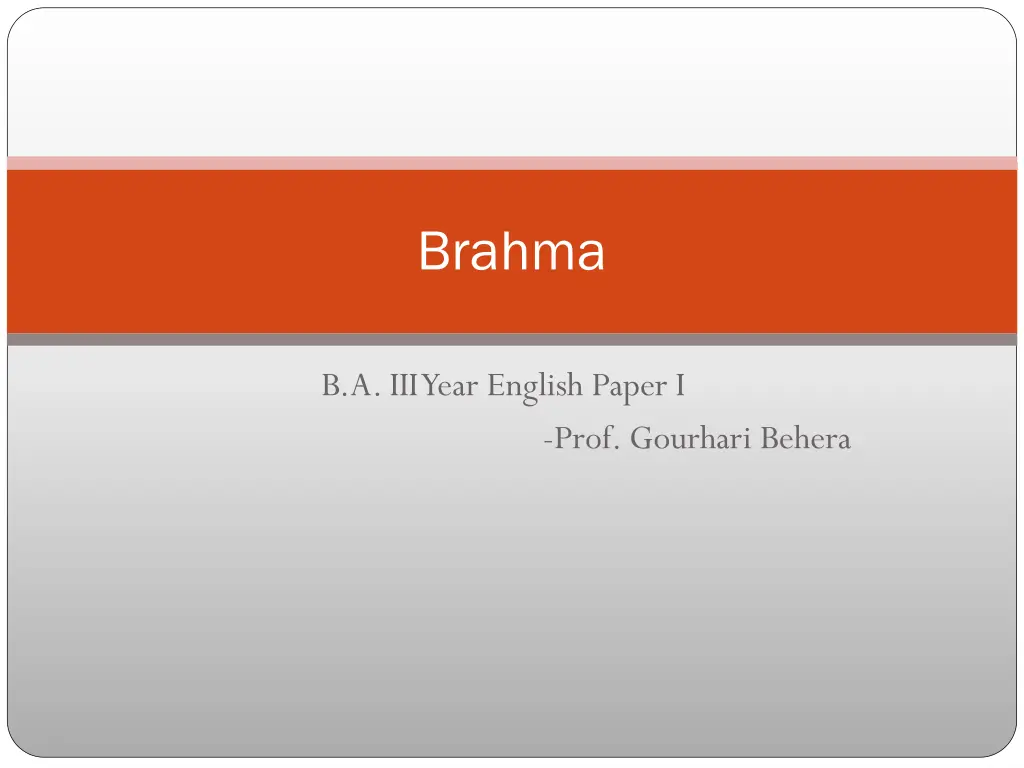
Influence of Indian Philosophy in Ralph Waldo Emerson's Brahma
Explore the profound influence of Indian philosophy on Ralph Waldo Emerson's poem "Brahma," showcasing the interconnectedness of all beings with the Supreme Power and the concept of the Over-soul. Emerson's admiration for Indian thought and its reflection in his literary works are highlighted, emphasizing the timeless wisdom and spiritual depth evident in his writings.
Download Presentation

Please find below an Image/Link to download the presentation.
The content on the website is provided AS IS for your information and personal use only. It may not be sold, licensed, or shared on other websites without obtaining consent from the author. If you encounter any issues during the download, it is possible that the publisher has removed the file from their server.
You are allowed to download the files provided on this website for personal or commercial use, subject to the condition that they are used lawfully. All files are the property of their respective owners.
The content on the website is provided AS IS for your information and personal use only. It may not be sold, licensed, or shared on other websites without obtaining consent from the author.
E N D
Presentation Transcript
Brahma B.A. III Year English Paper I -Prof. Gourhari Behera
Ralph Waldo Emerson (1803- 1882) was one of the most significant literary figures of 19thCentury American literature. He was a voracious reader and was highly influenced by Indian Philosophy and religion. He was associated with American Transcendentalism and seen as a champion of individualism. He believed that all things are connected to God and, therefore, all things are divine. He believed that God does not have to reveal the truth but that the truth could be intuitively experienced directly from nature. Many of his poems and essays are based on Indian philosophical concepts like maya, karma, punarjanma etc. Brahma is one of his most popular and anthologized poems.
In Brahma we can see the influence of Indian thought very easily. According to Vedantic philosophy there is one Supreme Power (Brahman) that governs and guides the entire universe. This Supreme power is the origin and destination of all beings. The being, in the form of atma through a series of cycles of births and deaths finally merges with the Supreme Power or Brahman. Emerson calls this power the Over-soul.
These ideas form the basis of the poem Brahma. In fact, the poem is almost a summary of the ideas contained in chapter 2, verse 19 of the Bhagwad Gita: He who thinks that he slays and he who thinks he is slain, both of them fail to perceive the truth; he neither slays nor is slain. (Translated by S. Radhakrishnan)
Brahma, the Over-soul, has neither beginning, nor end. It is omnipresent and omniscient. It can neither be created nor destroyed. The killer and the killed are just appearance and false because the soul which is a manifestation of the Over- soul cannot be killed. So to assume that the slayer has slain is to be in the clutches of ignorance
The Over-soul or Brahma is beyond time and space. The notion of distance is not applicable in case of Brahma. Even opposites like Shadow and sunlight are unreal in the realm of Brahma. Same is the case with moral categories like shame and fame. The Over-soul or Brahma is both the doubter and the doubt; the hymn as well as the object of the hymn. Thus, at the level of the Over-soul or Brahma all distinction and opposites vanish
Even the gods desire to attain Brahma. The sacred seven or the Sapta Rishis, the embodiment of highest knowledge, also try in vain to attain the abode of Brahma. But only the meek lover of the good , meaning the humble follower of goodness (dharma) is able to attain Brahma.
This lyric consisting of four stanzas with every stanza having four lines has a regular rhyme pattern: ab ab, cd cd, ef ef, gh gh. The poet employs alliteration in Far-forgot , shadow and sunlight doubter-doubt , shame-fame . Inversion is used in phrases like The vanished gods to me appear and when me they fly . (Compiled from many sources)
